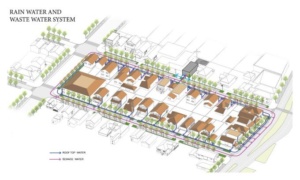A Resilient, Decarbonized Neighborhood Pilot Retrofit
 OFPI is a proud supporter of Oakland EcoBlock, a radical retrofit of existing residential homes, establishing a neighborhood block that is more resilient to power outages, creating homes with improved indoor air quality, and allowing residents to co-own the main means of their energy production.
OFPI is a proud supporter of Oakland EcoBlock, a radical retrofit of existing residential homes, establishing a neighborhood block that is more resilient to power outages, creating homes with improved indoor air quality, and allowing residents to co-own the main means of their energy production.
Halving emissions by 2030 requires innovative ideas and bold moves, especially for existing urban residential building stock. Electrification of natural gas loads and adopting solar plus storage systems have been hindered by transaction costs associated with customer acquisition, permitting, financing and construction inherent to the one- house-at-a-time model, and limited access to capital to finance the high upfront costs. Since about 60% of California’s housing stock was constructed before energy codes, tackling this scale of retrofits calls for a strategic plan that leverages the economies of scale of retrofitting multiple neighboring houses at the same time.
The Oakland EcoBlock advances a new model for scaling resilient, low-carbon solutions in existing neighborhoods through block-scale retrofitting that combines energy efficiency, electrification, water conservation, and rooftop solar plus battery storage systems, including EV car sharing and curbside charging in a low-to-middle income neighborhood in the City of Oakland.
Named as one of 22 microgrid projects to watch in 2022 by Microgrid Knowledge, the project aims to:
• Rapidly and equitably reduce carbon emissions through electrification and EV car sharing;
• Build clean energy resilience with a rooftop solar microgrid that provides power to the block during power outages
• Create a nonprofit mutual benefit corporation of homeowners and tenants to own and govern the microgrid
• Strengthen community by promoting connections and shared goals. The Oakland EcoBlock is sponsored by the California Energy Commission (CEC) through their
Electricity Program Investment Charge (EPIC) Challenge to accelerate the deployment of Advanced Energy Communities; CEC funded Phase 1 design and is now funding Phase 2 build (Contract Number: EPC-18-013).
The EcoBlock research team consists of professionals, city government, academics, and national lab researchers committed to partnering with neighborhoods in their transformation to resilient, low-carbon communities.
To Learn More, Visit – LINK




